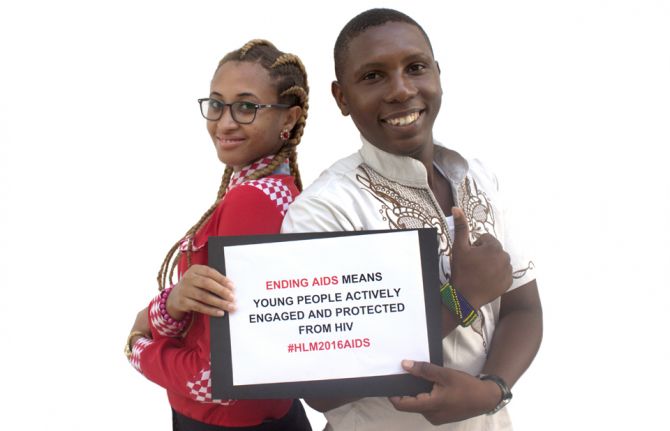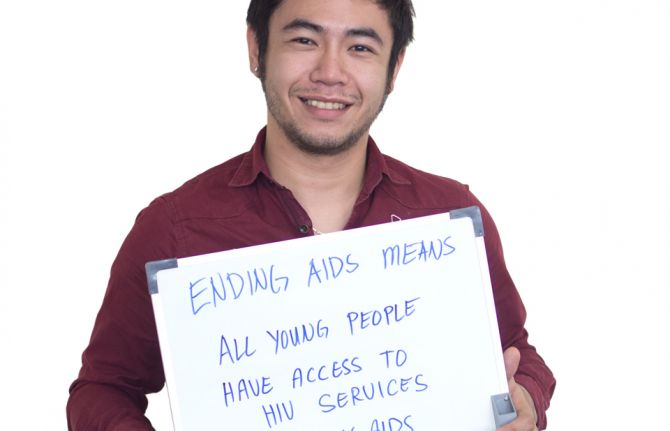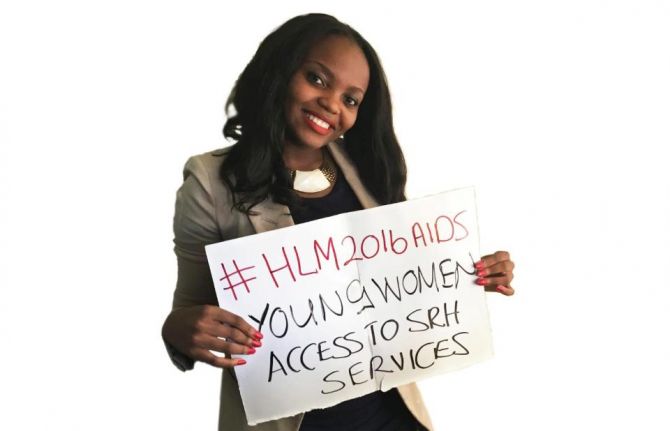



Update
Breaking down the barriers on international youth day – young people need better access to HIV services
12 August 2016
12 August 2016 12 August 2016National policies and practices continue to prevent young people (aged 10-24 years) from accessing the HIV, sexual and reproductive health and rights services that they need. On this International Youth Day, UNAIDS calls on national authorities, civil society organizations, youth activists and all stakeholders in the AIDS response to review and challenge national policies, such as those related to age of consent and spousal consent, which may cause young people to be left behind in the HIV response.
In 2015, about 1800 new HIV infections, and 150 AIDS-related deaths occurred every day among youth aged 15-24 years globally. Almost 4 million young people aged 15-24 are living with HIV, many of whom do not know their HIV status. Adolescents (10-19) are the only age group among whom AIDS-related deaths are increasing. Today, only 36% of young men and 30% of young women (ages 15-24) in sub-Saharan Africa have comprehensive and correct knowledge of how to prevent HIV infection.
Some countries continue to have age of consent policies that deter adolescents from accessing HIV testing and counselling services, without the consent of a parent or guardian. Spousal consent —the legal obligation for a woman or girl to ask permission from her husband to access a service— also hampers access to services for adolescent girls and young women. Adolescent girls and young women bear a disproportionate burden of new HIV infections among young people, 58% globally and 66% in sub-Saharan Africa in 2015. Twenty-seven countries require spousal consent for women to access any sexual and reproductive health service. Moreover, young key populations are frequently subjected to violence, stigma, discrimination and exclusion, and must be ensured a legal environment that respects, protects and promotes their human rights for any progress in the HIV response to be sustained.
UNDP supported a systematic desk review of age-of-consent laws and policies, as part of the All In partnership to engage, mobilize and support adolescents as leaders and agents of social change. The analysis, presented at the 2016 International AIDS Conference in Durban, South Africa recommends that: “at a minimum, countries should (i) specifically provide for age of consent laws that are non-contradictory and that reflect the evolving capacity, age and maturity of the adolescent; (ii) ensure that the age of consent applies to all adolescents, irrespective of sex, gender, sexual orientation or gender identity; and (iii) consider providing for an adolescent who has not reached the age set by law to provide consent based on an assessment of factors, such as the evolving capacity, age and maturity of the adolescent, the risk of HIV infection and the independence from or absence of parental or alternative care. For instance, the age of consent to HIV testing should not be higher than the age of consent to sex so that a sexually active adolescent should be able to consent to HIV testing. Furthermore, once an adolescent can consent to HIV testing, the adolescent should be able to independently consent to other HIV prevention, treatment and care services."
Building on this effort through the All In partnership, UNAIDS is supporting the development of an age of consent advocacy pack, for youth advocates, youth-led and youth serving organizations and networks vested in amending consent laws for the benefit of young people’s access to services. This advocacy pack is expected to be piloted in India and Zimbabwe in the following months.
Moreover, UNAIDS, in partnership with the International Planned Parenthood Federation (IPPF) and The PACT, are supporting youth alliances working on HIV and sexual and reproductive health and rights in Algeria, Bulgaria, India, Jamaica, Kenya, Mexico, Nigeria, Philippines, South Africa, Uganda, Zambia and Zimbabwe through the ACT!2015 youth-led social action initiative. ACT!2015 aims to strengthen young people’s evidence gathering and data analysis skills to facilitate advocacy and accountability around policies that limit young people’s access to services.
Quotes
“AIDS-related deaths are rising among only one population group and that is young people. We will fail to achieve the end of AIDS if national policies and practices continue to restrict young people's access to HIV, sexual and reproductive health services. We must tackle the determinants of HIV risk and vulnerability and facilitate the realization of young people’s rights so that they can achieve their full potential in life.”
“Bad laws fuel the spread of HIV, block effective responses to HIV and violate human rights. Through the All In platform, UNDP, UNAIDS and other UN organizations are invested in continuing our support to young people’s advocacy, and supporting countries to reform laws and policies that hamper young people’s access to services. Upholding young people’s rights is an integral part of a sustainable HIV response."
“The collective vision behind ACT!2015 is the fulfilment of young people’s sexual and reproductive rights everywhere, through strong partnerships and unwavering support to the national youth alliances in country. This project is so important because it centres around youth experiences and youth-led advocacy as a tool for policy change, targeting the barriers that restrict young people’s rights and impact on their sexual and reproductive health.”
“If policies become more friendly, young people will have healthier behaviours because they will not be afraid to access services."



